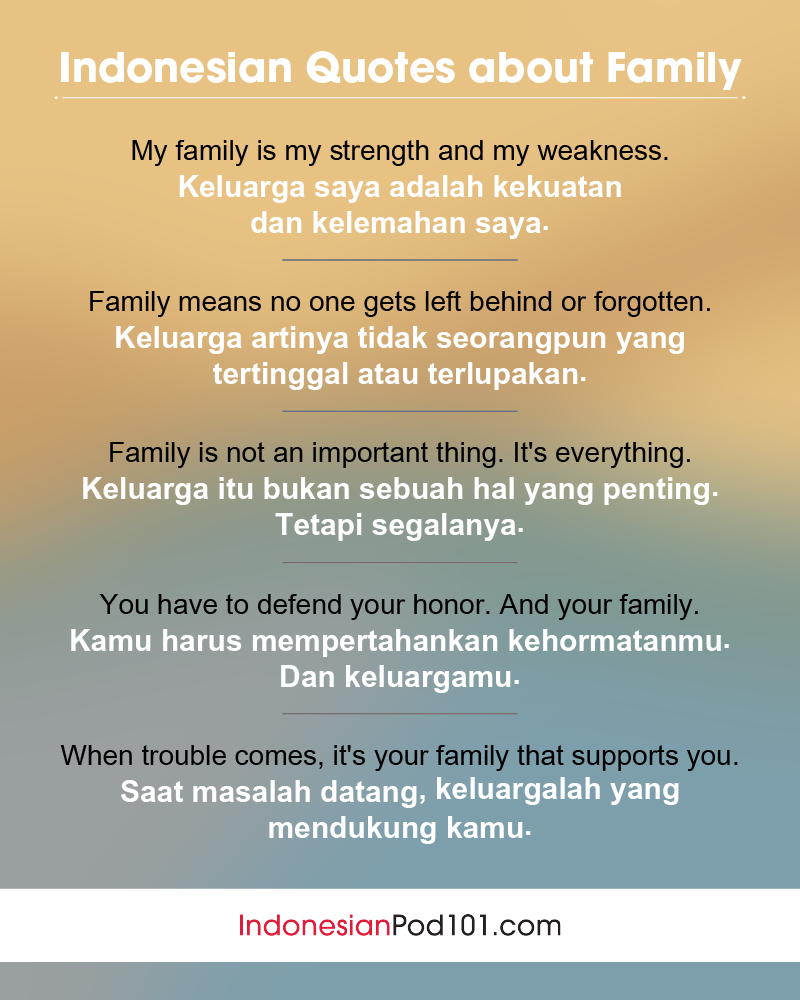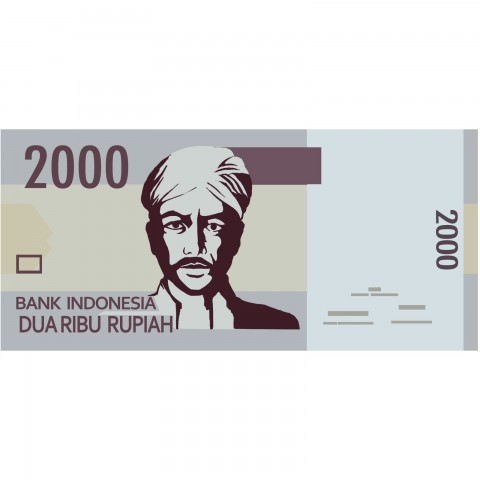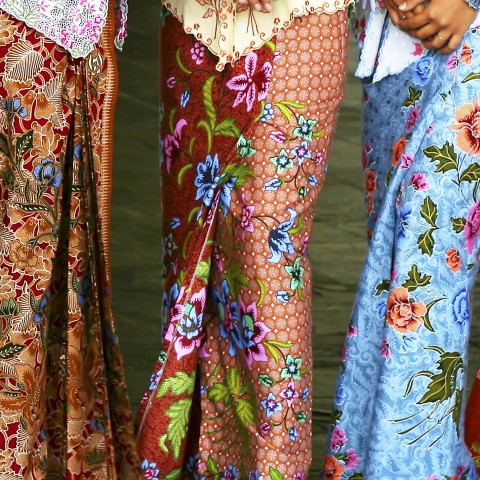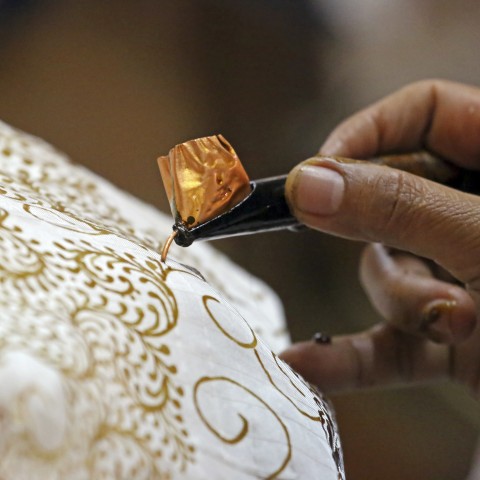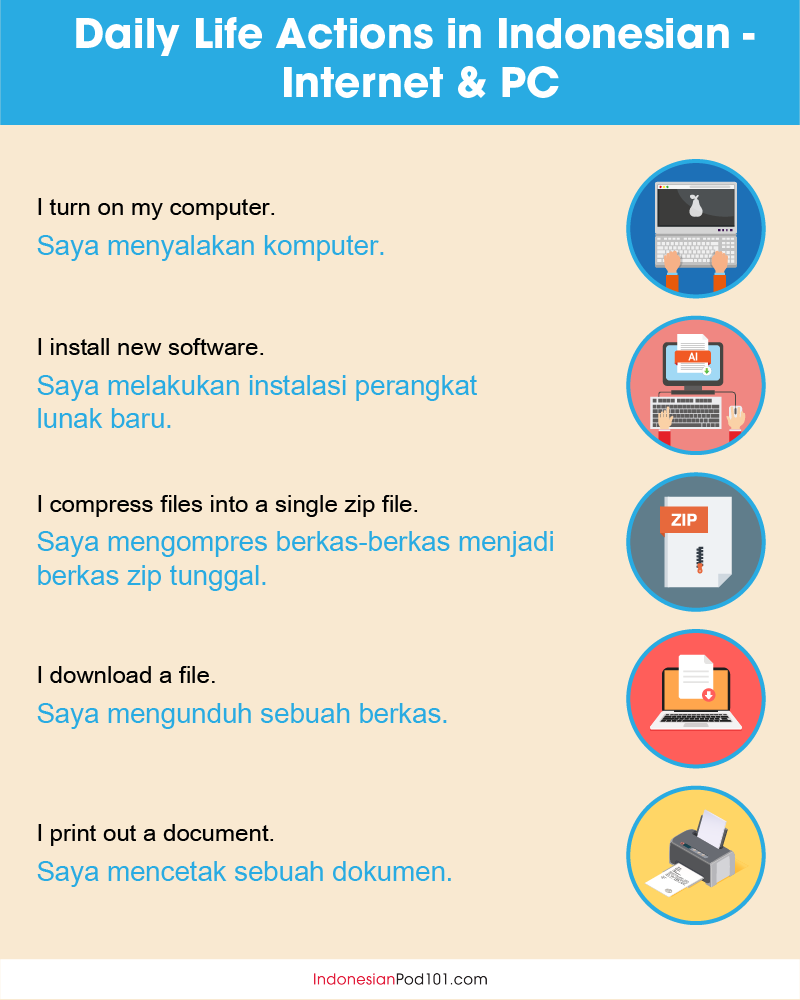
You’re learning to speak Indonesian, and it’s going well. Your confidence is growing! So much so that you feel ready to share your experiences on social media—in Indonesian.
At Learn Indonesian, we make this easy for you to get it right the first time. So, post like a boss with these phrases and guidelines, and get to practice your Indonesian in the process.

1. Talking about Your Restaurant Visit in Indonesian
Eating out is often fun, and an experience you want to share. Post a suitable pic of yourself in the restaurant, and start a conversation on social media in Indonesian. Your friend will be amazed by your language skills…also perhaps your taste in restaurants!
Indra eats out with his friends, posts an image of the restaurant, and leaves a comment:

POST
Let’s break down Indra’s post.
Restoran ini suasananya enak sekali.
“This restaurant’s atmosphere is very good.”
1- Restoran ini
First is an expression meaning “This restaurant.”
This expression indicates the topic of the rest of the sentence.
2- Suasananya enak sekali
Then comes the phrase – “The atmosphere is very good.”
This expression explains the topic. The particle ‘-nya’ expresses possession. Therefore, ‘suasananya’ means ‘the atmosphere of…’
COMMENTS
In response, Indra’s friends leave some comments.
1- Makanannya enak tidak?
His college friend, Doni, uses an expression meaning – “Is the food good or not?”
Use this expression to show your interest in the topic.
2- Restoran ini ada di mana?
His high school friend, Tiwi, uses an expression meaning – “Where is this restaurant?”
Use this expression to show you are feeling curious.
3- Kayaknya mahal, Om.
His girlfriend’s nephew, Johan, uses an expression meaning – “It seems expensive, Uncle.”
Use this expression to indicate awe.
4- Halo Indra. Kapan-kapan mari kita makan bersama di sana.
His neighbor, Sri, uses an expression meaning – “Hello, Indra. Let’s eat together there sometime.”
Use this expression to show feelings of warmhearted friendship.
VOCABULARY
Below, the key vocabulary for this lesson:
suasana: “atmosphere, mood, ambiance”
enak: “good (as in “taste good”, “feels good” )”
di mana: “where”
kayaknya: “to seem, to look like”
kapan-kapan: “sometime”
mari: “let’s”
bersama: “together”
restoran: “restaurant”
So, let’s practice a bit. If a friend posted something about having dinner with friends, which phrase would you use?
Now go visit a Indonesian restaurant, and wow the staff with your language skills!
2. Post about Your Mall Visit in Indonesian
Another super topic for social media is shopping—everybody does it, most everybody loves it. Also, your friends on social media are probably curious about your shopping sprees! Share these Indonesian phrases in posts when you visit a mall.
Susi shops with her sister at the mall, posts an image of it, and leaves this comment:

POST
Let’s break down Susi’s post.
Baru beli baju buat liburan, pas diskon!
“Just bought clothes for a holiday, right on time for a discount!”
1- baru beli baju buat liburan
First is an expression meaning “just bought clothes for holiday.”
When the word ‘baru’ is put in front of a verb, it gives the meaning of “just did…”
2- pas diskon
Then comes the phrase – “right in time of discount.”
When the word ‘pas’ is put in front of an expression of condition (adjective, noun), it gives the meaning of ‘right at the time of (the condition)’.
COMMENTS
In response, Susi’s friends leave some comments.
1- Wah, bajunya bagus ya Bu Susi.
Her neighbor, Sri, uses an expression meaning – “Wow, the clothes are good, Mrs. Susi.”
Use this expression to show you are feeling warmhearted and appreciative.
2- Beli di mana, Sus?
Her high school friend, Lita, uses an expression meaning – “Where did you buy, Sis?”
Use this expression to be engaging.
3- Hai Susi apa kabar? Salam buat Indra ya!
Her boyfriend’s high school friend, Tiwi, uses an expression meaning – “Hi Susi, how are you? Say hi to Indra, ok!”
Use this expression to show you are feeling friendly.
4- Bu Susi sering sekali belanja ya hehe..
Her supervisor, Adam, uses an expression meaning – “Mrs. Susi, you really go shopping often, haha”
Use this expression to be humorous.
VOCABULARY
Find below the key vocabulary for this lesson:
baru: “just did”
wah: “wow”
salam: “regards”
buat: “for”
hehe: “hehe (expression for teasing)”
belanja: “to do shopping”
sering: “often”
diskon: “discount”
So, if a friend posted something about going shopping, which phrase would you use?
3. Talking about a Sport Day in Indonesian
Sport events, whether you’re a spectator or a participant, offer fantastic opportunities for great social media posts. Learn some handy phrases and vocabulary to start a sport-on-the-beach conversation in Indonesian.
Indra plays with his friends at the beach, posts an image of it, and leaves this comment:

POST
Let’s break down Indra’s post.
Hore tim saya menang lagi!
“Yeah, my team won again!”
1- Hore
First is an expression meaning “Yeah, hurray.”
This is an exclamation that expresses joy.
2- Tim saya menang lagi
Then, the phrase – “My team won again.”
The word ‘lagi’ means ‘again.’
COMMENTS
In response, Indra’s friends leave some comments.
1- Selamat ya! Tim saya kurang beruntung hari ini.
His college friend, Doni, uses an expression meaning – “Congratulations! My team was out of luck today.”
Use this expression to show you are feeling frivolous.
2- Kok saya tidak diajak, Om
His girlfriend’s nephew, Johan, uses an expression meaning – “How come I wasn’t invited, Uncle.”
Use this expression to show you are feeling disappointed.
3- Selamat! Berikutnya tim saya pasti bisa menang.
His high school friend, Tiwi, uses an expression meaning – “Congratulations! Next time my team will definitely (be able to) win!”
Use this expression to show you are feeling optimistic.
4- Warna bolanya lucu ya!
His girlfriend’s high school friend, Lita, uses an expression meaning – “The color of the ball is cute, right!”
Use this expression to be funny.
VOCABULARY
Find below the key vocabulary for this lesson:
tim: “team”
selamat: “congratulations”
kok: “why, how come”
pasti: “certainly, definitely”
lucu: “cute”
ya: “right? (asking a confirmation)”
diajak: “to be invited”
beruntung: “lucky”
Which phrase would you use if a friend posted something about sports?
But sport is not the only thing you can play! Play some music, and share your thoughts about it on social media.
4. Share a Song on Social Media in Indonesian
Music is the language of the soul, they say. So, don’t hold back—share what touches your soul with your friends!
Susi shares a song she just heard at a party, posts a link with the song, and leaves this comment:

POST
Let’s break down Susi’s post.
Sudah lama sekali nggak dengar lagu ini, jadi ingat masa SMA.
“I haven’t heard this song in a long time. It reminds me of high school.”
1- Sudah lama sekali nggak dengar lagu ini
First is an expression meaning “It has been a long time not listening to this song..”
“sudah lama sekali gak….” is often used to express a situation that hasn’t been encountered for quite a long time.
2- Jadi ingat masa SMA.
Then comes the phrase – “It reminds me of my high school time..”
“jadi” (become) is often used to express a result or the effect of a situation.
COMMENTS
In response, Susi’s friends leave some comments.
1- Iya, makanya tadi abis pesta langsung beli albumnya.
Her boyfriend, Indra, uses an expression meaning – “Yes, that’s why after the party I immediately bought the album.”
Use this expression in response to an appropriate comment.
2- Aku suka dengan penyanyinya, liriknya bagus
Her boyfriend’s high school friend, Tiwi, uses an expression meaning – “I like the singer. The lyrics are good.”
Use this expression to show you are feeling appreciative.
3- Haha, jadi kangen jaman dulu
Her high school friend, Lita, uses an expression meaning – “Haha, it made me miss my past.”
Use this expression to be funny.
4- Saya juga suka lagu itu, Bu.
Her supervisor, Adam, uses an expression meaning – “I also like that song, Ma’am. ”
This is also an expression of appreciation.
VOCABULARY
Find below the key vocabulary for this lesson:
jadi: “to become”
makanya: “that’s why”
suka: “to like”
kangen: “to miss”
juga: “too, also”
nggak: “not”
langsung: “directly, immediately”
sudah lama sekali nggak: “It’s been a while since…”
Which song would you share? And what would you say to a friend who posted something about music or music videos?
Now you know how to start a conversation about a song or a video on social media!
5. Indonesian Social Media Comments about a Concert
Still on the theme of music—visiting live concerts and shows just have to be shared with your friends!
Here are some handy phrases and vocab to wow your followers with in Indonesian!
Indra goes to a concert, posts an image of it, and leaves this comment:

POST
Let’s break down Indra’s post.
Live dari Java Jazz Festival 2017! Ada yang lagi di sini juga?
“Live from Java Jazz Festival 2017! Is anybody (else) here too?”
1- Live dari Java Jazz Festival 2017!
First is an expression meaning “Live from Java Jazz Festival 2017!.”
Java Jazz Festival is an annual jazz concert in Jakarta.
2- Ada yang lagi di sini juga?
Then comes the phrase – “Is anybody here too?” It’s use should be clear.
COMMENTS
In response, Indra’s friends leave some comments.
1- Yang penting besok jangan terlambat masuk kantor, ya.
His supervisor, Adam, uses an expression meaning – “The important thing is don’t be late for work tomorrow, ok.”
This phrase can be teasing and humorous, depending on how well you know your supervisor!
2- Tidak bosan setiap tahun nonton, Om?
His girlfriend’s nephew, Johan, uses an expression meaning – “You don’t get bored watching this every year, Uncle?”
Use this expression to make conversation and tease someone.
3- Saya juga senang musik jazz tetapi tidak suka pergi ke konser.
His neighbor, Sri, uses an expression meaning – “I also like jazz music, but I don’t like to go to concerts.”
Use this expression to share your preferences and thoughts on the topic.
4- Mantap!
His girlfriend, Susi, uses an expression meaning – “Great!”
Use this expression when you are feeling encouraging and enthusiastic.
VOCABULARY
Below, the key vocabulary for this lesson:
yang penting: “the important thing is”
terlambat: “late”
bosan: “bored”
Om: “uncle, Sir”
mantap: “great, good job”
nonton: “to watch”
konser: “concert”
jangan: “do not”
If a friend posted something about a concert , which phrase would you use?
6. Talking about an Unfortunate Accident in Indonesian
Oh dear. You broke something by accident. Use these Indonesian phrases to start a thread on social media. Or maybe just to let your friends know why you are not contacting them!
Susi accidentally breaks her mobile phone, and leaves this comment:

POST
Let’s break down Susi’s post.
Aduh, handphoneku jatuh. Kacanya pecah. Huhu…
“Ouch, my cellphone fell. The glass is broken; (I’m) sad.”
1- Aduh, handphoneku jatuh (Aduh, handphoneku jatuh)
First is an expression meaning “Ouch, my cellphone fell..”
The word ‘aduh’ is often used when something unfortunate happened.
2- Kacanya pecah, huhu. (Kacanya pecah, huhu.)
Then comes the phrase – “The glass is broken; sad..”
The suffix -nya refers to the phone mentioned in the previous sentence. It becomes ‘the glass of the phone.’
COMMENTS
In response, Susi’s friends leave some comments.
1- Astaga, kok bisa Sus?
Her boyfriend, Indra, uses an expression meaning – “Gosh, how come, Sus?”
Use this phrase to express sympathetic interest in the topic.
2- Tinggal beli lagi, Tante.
Her nephew, Johan, uses an expression meaning – “Just buy again, Aunty.”
Here, the phrase is used to advise someone.
3- Yah…
Her college friend, Doni, uses an expression meaning – “Oh…”
This is a useful filler depicting understanding when you don’t have much to say.
4- Masih asuransi tidak?
Her boyfriend’s high school friend, Tiwi, uses an expression meaning – “Is it still insured?”
You’re making conversation by asking quesitions.
VOCABULARY
Find below the key vocabulary for this lesson:
aduh: “ouch”
astaga: “gosh”
kok bisa: “how come”
tinggal: “just need to”
masih: “still”
asuransi: “insurance”
yah: “oh (for disappointment)”
huhu: “(onomatopoeia for crying)”
If a friend posted something about having broken something by accident, which phrase would you use?
So, now you know how to talk about an accident in Indonesian. Well done!
7. Chat about Your Boredom on Social Media in Indonesian
Sometimes, we’re just bored with our lives. And to alleviate the boredom, we discuss it on social media. Add some excitement to your posts by addressing your friends and followers in Indonesian!
Indra gets bored at home, and leaves this comment:

POST
Let’s break down Indra’s post.
Aduh bosan sekali di rumah.
“Ouch, it’s so boring at home.”
1- Aduh!
First is an expression meaning “Ouch!”
Expresses an unfortunate or unsatisfactory situation.
2- Bosan sekali di rumah.
Then comes the phrase – “It is very boring at home…”
For such expression, the subject (such as ‘it is’ ) is not necessary.
COMMENTS
In response, Indra’s friends leave some comments.
1- Sudah cuci pakaian belum?
His girlfriend, Susi, uses an expression meaning – “Have you washed the clothes?”
Ask this when you’re feeling bossy! Or to ask this question, obviously.
2- Main ke tempatku aja
His college friend, Doni, uses an expression meaning – “Just come to my place.”
This is obviously a friendly invitation and suggestion.
3- Emangnya tante Susi ke mana, Om?
His girlfriend’s nephew, Johan, uses an expression meaning – “Actually, where is aunt Susi, Uncle?”
This can be a question when you’re feeling humorous.
4- Apa kabar, Indra? Lama gak ketemu.
His high school friend, Tiwi, uses an expression meaning – “How are you, Indra? Long time no see.”
Use this expression to show you are feeling nostalgic and friendly.
VOCABULARY
Find below the key vocabulary for this lesson:
rumah: “home”
sudah: “already”
cuci: “to wash”
main: “to come, to play, to hang out”
emangnya: “actually, indeed”
lama: “long”
ketemu: “to meet (casual)”
belum: “not yet”
If a friend posted something about being bored, which phrase would you use?
Still bored? Share another feeling and see if you can start a conversation!
8. Exhausted? Share It on Social Media in Indonesian
When sitting in public transport after work, do you feel like chatting online? Well, share your thoughts in Indonesian, and let your friends join in!
Susi feels exhausted after a long day at work, posts an image of herself looking tired, and leaves this comment:

POST
Let’s break down Susi’s post.
Pekerjaan gak habis-habis. Cape….
“Work is endless. I’m tired….”
1- Pekerjaan gak habis-habis.
First is an expression meaning “Jobs are endless..”
The phrase “gak” or “tidak,” followed by a repeated word that indicates a state, indicates that the state has not been not reached even though time has passed, and much effort has been exerted. Other examples are “tidak selesai-selesai”, “tidak maju-maju”, and “gak menang-menang”.
2- Cape….
Then comes the phrase – “(I am) tired….”
It is common to omit the subject when the context is clear.
COMMENTS
In response, Susi’s friends leave some comments.
1- Jangan mengeluh, Susi.
Her supervisor, Adam, uses an expression meaning – “Don’t complain, Susi.”
If you have a good, friendly relationship with someone, this can be a playful admonition.
2- Sebentar lagi aku jemput.
Her boyfriend, Indra, uses an expression meaning – “I’ll pick you up soon.”
In this context, this comment expresses encouragement, trying to lift Susi’s spirit.
3- Tetap semangat, Susi!
Her boyfriend’s high school friend, Tiwi, uses an expression meaning – “Keep up your spirits, Susi!”
Another friendly, encouraging comment.
4- Pulang Sus, pulang…
Her college friend, Doni, uses an expression meaning – “Go home Sus, go home…”
In this context, the friend is being humorous.
VOCABULARY
Find below the key vocabulary for this lesson:
cape: “tired (casual)”
mengeluh: “to complain”
sebentar lagi: “soon”
jemput: “to pick up”
semangat: “spirit, motivation”
tetap: “stay, permanent”
pulang: “to go home”
pekerjaan: “job”
If a friend posted something about being exhausted, which phrase would you use?
Now you know how to use even more phrases in Indonesian! Well done.
9. Talking about an Injury in Indonesian
So life happens, and you managed to hurt yourself during a soccer game. Very Tweet-worthy! Here’s how to do it in Indonesian.
Indra suffers a painful injury, posts an image of himself, and leaves this comment:

POST
Let’s break down Indra’s post.
Aduh kaki keseleo!
“Ouch, my foot is sprained!”
1- Aduh!
First is an expression meaning “Ouch!.”
This expression indicates an unfortunate feeling, situation or event.
2- Kaki keseleo.
Then comes the phrase – “My foot is sprained..”
This expression uses very simple grammar: a subject and a verb.
COMMENTS
In response, Indra’s friends leave some comments.
1- Aduh kok bisa Pak Indra? Semoga segera sembuh.
His neighbor, Sri, uses an expression meaning – “Ouch, how come, Mr. Indra? Please get well soon.”
This is an expression of commiseration and a friendly wish.
2- Di dekat rumah saya ada klinik ortopedi, Pak.
His supervisor, Adam, uses an expression meaning – “Near my home, there’s an orthopedic clinic, Sir.”
The supervisor gives advice.
3- Cepat sembuh ya, Ndra!
His girlfriend’s high school friend, Lita, uses an expression meaning – “Get well soon, Indra!”
A friendly, sympathetic expression, wishing someone well.
4- Kok bisa, Indra?
His high school friend, Tiwi, uses an expression meaning – “How come, Indra?”
Use this expression to show you are feeling curious.
VOCABULARY
Find below the key vocabulary for this lesson:
keseleo: “to be sprained”
semoga: “hopefully, I hope”
sembuh: “to recover, to get well”
kok bisa: “how come”
klinik: “clinic”
dekat: “near, close”
segera: “soon”
Pak: “sir, Mr.”
If a friend posted something about being injured, which phrase would you use?
We love to share our fortunes and misfortunes; somehow that makes us feel connected to others.
10. Starting a Conversation Feeling Disappointed in Indonesian
Sometimes things don’t go the way we planned. Share your disappointment about this with your friends!
Susi feels disappointed about today’s weather, posts an appropriate image, and leaves this comment:

POST
Let’s break down Susi’s post.
Kenapa hujannya tidak berhenti…
“Why doesn’t the rain stop…”
This is a rhetorical question, expressing a sense of disappointment.
1- kenapa hujannya
First is an expression meaning “why does the rain.”
The suffix -nya indicates the definite particle ‘the.’
2- tidak berhenti…
Then comes the phrase – “not stop.”
When we use rhetorical questions, we’re wondering out loud! Susi is not asking somebody else about the rain; she is wondering to herself. That’s why she used an ellipsis at the end of the sentence instead of a question mark.
COMMENTS
In response, Susi’s friends leave some comments.
1- Halo Bu Susi, cuacanya sedang kurang bagus, jaga kesehatan, ya.
Her neighbor, Sri, says – “Hello, Mrs. Susi. The weather isn’t good. Please take care of your health.”
These words show friendly concern and sympathy with Susi’s sentiments.
2- Cuacanya enak buat tidur hehehe.
Her college friend, Doni, uses an expression meaning – “The weather is good for sleeping, hehe.”
This is a humorous comment.
3- Tidak apa-apa, supaya segar.
Her boyfriend’s high school friend, Tiwi, says – “It’s ok. It’ll make things fresh.”
This is an optimistic comment and opinion.
4- Jadi malas ngapa-ngapain.
Her high school friend, Lita, uses an expression meaning – “It makes me lazy to do anything.”
Here, a bit of personal information is shared.
VOCABULARY
Find below the key vocabulary for this lesson:
kenapa: “why”
sedang: “doing something in an ongoing state”
kesehatan: “health”
tidak apa-apa: “it is ok, it is fine”
malas: “lazy”
ngapa-ngapain: “to do anything”
jadi: “so, become”
kurang: “not so, less”
How would you comment in Indonesian when a friend is disappointed?
Not all posts need to be about the negatives, though!
11. Talking about Your Relationship Status in Indonesian
Don’t just change your relationship status in Settings – talk about it!
Indra changes his status to “In a relationship”, posts an image of him and Susi, and leaves this comment:

POST
Let’s break down Indra’s post.
Setelah 2 tahun, akhirnya…
“After two years, finally…”
1- Setelah 2 tahun,
First is an expression meaning “After 2 years,.”
This expression indicates the length of time Indra has been waiting for Susi.
2- akhirnya…
Then comes the phrase – “finally….”
Even though the sentence itself does not explain what the ‘finally’ about, the context is clear from the picture.
COMMENTS
In response, Indra’s friends leave some comments.
1- Terima kasih ya…
Susi expresses gratitude for his post with: “Thank you.”
2- Selamat ya, Om!
His girlfriend’s nephew, Johan, uses an expression meaning – “Congratulations, Uncle!”
The phrase is self-explanatory.
3- Ciyeeee… 😉
His girlfriend’s high school friend, Lita, uses an expression meaning – “Look at you guys! (teasing)”
The emoji gives away her frivolous mood; it is also an appreciative, positive statement.
4- Sudah tidak galau lagi donk, Ndra!
His college friend, Doni, says – “So you’re no longer worried, are you, Indra!”
This is obviously a humorous, friendly comment.
VOCABULARY
Find below the key vocabulary for this lesson:
setelah: “after”
akhirnya: “finally”
terima kasih: “thank you”
ciyeee: “(teasing word for something romantic)”
galau: “confused, worried”
donk: “expression of certainty”
sudah: “already”
tidak lagi: “no more”
What would you say in Indonesian when a friend changes their relationship status?
Being in a good relationship with someone special is good news – don’t be shy to spread the news!
12. Post about Getting Married in Indonesian
Wow, so things got serious, and you’re getting married. Congratulations! Or, your friend is getting married, so talk about this in Indonesian.
Susi is getting married today, so she leaves this comment:

POST
Let’s break down Susi’s post.
Terima kasih sudah datang di hari bahagiaku!
“Thank you for coming to my happy day.”
1- terima kasih sudah datang
First is an expression meaning “thank you for coming.”
This comment expresses gratitude for the guests for joining her and Indra at the wedding.
2- di hari bahagiaku
Then comes the phrase – “to my happy day.”
The expression “hari bahagia” in Indonesian is mostly associated with a wedding day.
COMMENTS
In response, Susi’s friends leave some comments.
1- Selamat ya, Bu Susi.
Her supervisor, Adam, uses an expression meaning – “Congratulations, Mrs. Susi.”
2- Semoga berbahagia, Susi dan Indra.
Her neighbor, Sri, uses an expression meaning – “I hope you two will be happy.”
This is a warm-hearted, friendly wish, appropriate to the event.
3- Akhirnya, Susi. Selamat menempuh hidup baru!
Her high school friend, Lita, uses an expression meaning – “Finally, Susi. Wishing you all the best in your new life!”
This is both a humorous comment and friendly wish.
4- Selamat!
Her nephew, Johan, uses an expression meaning – “Congratulations!”
Use this expression to congratulate someone on any occasion.
VOCABULARY
Find below the key vocabulary for this lesson:
hari: “day”
semoga: “I hope, hopefully”
menempuh: “to go through (a journey)”
hidup: “life”
baru: “new”
bahagia: “happy”
datang: “to come”
selamat: “congratulations, happy”
How would you respond in Indonesian to a friend’s post about getting married?
For the next topic, fast forward about a year into the future after the wedding…
13. Announcing Big News in Indonesian
Wow, huge stuff is happening in your life! Announce it in Indonesian.
Indra finds out he and his wife are going to have a baby, posts an appropriate image, and leaves this comment:

POST
Let’s break down Indra’s post.
Kabar gembira! Saya akan jadi seorang ayah!
“Good news! I will be a father!”
1- Kabar gembira!
First is an expression meaning “Good news!.”
This expression is used in the same way the expression “Good news” is used in English.
2- Saya akan jadi seorang ayah!
Then comes the phrase – “I will be a father!.”
The phrase “akan jadi” is the casual form of “akan menjadi”, which means “will be”.
COMMENTS
In response, Indra’s friends leave some comments.
1- Selamat ya, Indra! Semoga Susi selalu sehat.
His neighbor, Sri, uses an expression meaning – “Congratulations, Indra! I hope Susi is always healthy.”
2- Wah, saya akan punya sepupu.
His nephew, Johan, says: “Wow, I will have a cousin.”
An appreciative comment.
3- Waaaaaaaa…. Congrats Susi!!
His wife’s high school friend, Lita, comments: “Waaaaaa…. Congrats Susi!”
It’s clear that Lita is excited and happy for her friend.
4- Selamat, Indra. Salam untuk Susi, semoga selalu sehat.
His supervisor, Adam, uses an expression meaning – “Congratulations, Indra. Please say hi to Susi; I hope she is always healthy.”
VOCABULARY
Find below the key vocabulary for this lesson:
kabar: “news”
ayah: “father”
seorang: “a (person)”
selalu: “always”
sepupu: “cousin”
sehat: “healthy”
gembira: “happy”
akan: “will”
Which phrase would you choose when a friend announces their pregnancy on social media?
So, talking about a pregnancy will give your posts a lot of traction on social media. But that’s nothing—wait till you see the responses to babies!
14. Posting Indonesian Comments about Your Baby
Your bundle of joy is here, and you cannot keep quiet about it. Share your thoughts in Indonesian.
Susi plays with her baby, posts an image of the smiling cutie, and leaves this comment:

POST
Let’s break down Susi’s post.
Senyum lebar setelah mandi dan sarapan pagi hehehe
“A big smile after a bath and breakfast, haha.”
1- senyum lebar
First is an expression meaning “a big smile.”
No subject is necessary here because it is clear from the context.
2- setelah mandi dan sarapan pagi hehehe
Then comes the explanation – “after a bath and breakfast, haha.”
This phrase provides additional info as to why the baby is smiling. The ‘haha” is an onomatopoeia for a giggle or small laugh.
COMMENTS
In response, Susi’s friends leave some comments.
1- Tampaknya ceria sekali. Semoga selalu sehat ya, Bu.
Her neighbor, Sri, uses an expression meaning – “He looks so cheerful. I hope he will always be healthy.”
This is a warmhearted expression of admiration, as well as a well-wish.
2- Kyaaaa anakmu lucu banget!
Her high school friend, Lita, uses an expression meaning – “Awww, your son is so cute!”
Another common expression of admiration.
3- Susi, wajahnya mirip sekali sama kamu.
Her husband’s high school friend, Tiwi, says: “Susi, his face resembles you, for real.”
Use this expression to express appreciation and start a conversation about babies.
4- Putranya lucu sekali, Bu Susi.
Her supervisor, Adam, uses an expression meaning – “Your son is so cute, Mrs. Susi.”
This is an expression of admiration, again. These should be very common when you post about a baby!
VOCABULARY
Find below the key vocabulary for this lesson:
senyum: “smile, to smile”
sarapan: “breakfast”
banget: “very”
lucu: “funny”
mirip: “similar”
putra: “son”
semoga: “may, wish”
mandi: “bath, shower”
If any of your friends is a new parent, which phrase would you use on social media?
Congratulations, you know the basics of chatting about a baby in Indonesian! But we’re not done with families yet…
15. Indonesian Comments about a Family Reunion
Family reunions – some you love, some you hate. Share about it on your feed.
Indra goes to a family gathering, posts an image of the event, and leaves this comment:

POST
Let’s break down Indra’s post.
Bertemu keluarga besar setahun sekali, syukurlah semua sehat.
“Our large family meets once a year; thank God that everybody is healthy.”
1- bertemu keluarga besar setahun sekali
First is an expression meaning “Our large family meets once a year..”
“Keluarga besar” can refer to not just size but also scope, i.e. not just father, mother, and children, but also grandfather, grandmother, and all of their kids and grandkids.
2- syukurlah semua sehat
Then comes the phrase – “Thank God that everybody is healthy..”
The word ‘syukurlah’ can be used not just as an interjection (like in ‘thank God!’ ), but also describes the state of being grateful.
COMMENTS
In response, Indra’s friends leave some comments.
1- Makasih fotonya, Om!
His nephew, Johan, says: “Thanks for the photos, Uncle!”
This expression shows he’s feeling grateful.
2- Kamu punya berapa saudara kandung?
His wife’s high school friend, Lita, uses an expression meaning – “How many siblings do you have?”
Use this expression when you’re inquisitive and want to start a conversation.
3- Aku sudah lama tidak reuni keluarga
His college friend, Doni, uses an expression meaning – “I haven’t had a family reunion in a long time.”
This phrase shows Doni is chatty and shares information.
4- Jangan lupa kirim fotonya ke Ayah, ya.
Susi, Indra’s wife, reminds him: “Don’t forget to send the photo to my father.”
VOCABULARY
Find below the key vocabulary for this lesson:
bertemu: “to meet”
syukurlah: “thank god, thank goodness, I am grateful”
saudara kandung: “siblings”
reuni: “reunion”
lupa: “to forget”
ayah: “father”
setahun sekali: “once a year”
makasih: “thanks”
Which phrase would be suitable for use on a friend’s photo about a family reunion on your feed?
16. Post about Your Travel Plans in Indonesian
So, the family is going on holiday. Do you know how to say something about being at the airport, waiting for a flight etc in Inddonesian? No worries if you don’t!
Susi waits at the airport for her flight, posts an image of it, and leaves this comment:

POST
Let’s break down Susi’s post.
Terminal Soekarno Hatta yang baru keren!
“The new Soekarno Hatta Terminal is cool!”
1- Terminal Soekarno Hatta yang baru
First is an expression saying: “The new Soekarno Hatta Terminal.”
The role of the word ‘yang’ here is as a definite article (‘the” ). It says ‘yang baru’, which implies that there are also other terminals, in this case, ‘the old terminal’ (‘yang lama’ ).
2- keren!
Then comes the phrase – “is cool!.”
This is a very common expression for showing amazement.
COMMENTS
In response, Susi’s friends and family leave some comments.
1- Kabari kalau sudah sampai ya.
Her husband, Indra, says: “Let me know when you arrive.”
He shows care to his wife.
2- Jangan lupa oleh-olehnya ya Tante, hehe
Her nephew, Johan, uses an expression meaning – “Don’t forget the souvenir, Aunt.”
Johan is making conversation, showing interest in the topic.
3- Mau pergi ke mana?
Her college friend, Doni, uses an expression meaning – “Where are you going (to go)?”
Doni is also showing interest in the topic and wants to know more.
4- Hati-hati di jalan!
Her husband’s high school friend, Tiwi, uses an expression meaning – “Be careful!”
This is a common expression to show care for a person’s wellbeing and safety.
VOCABULARY
Find below the key vocabulary for this lesson:
terminal: “terminal”
kabari: “let someone know”
oleh-oleh: “souvenirs”
mau: “to want, going to”
hati-hati: “take care, be careful”
jalan: “way, street”
kalau: “if”
sampai: “to arrive”
Choose and memorize your best airport phrase in Indonesian.
Hopefully Susi’s whole trip is fantastic…!
17. Posting about an Interesting Find in Indonesian
So maybe you’re strolling around at your local market, and find something interesting. Here are some handy Indonesian phrases to report on your outing!
Indra finds an unusual item at a local market, posts an image of it, and leaves this comment:

POST
Let’s break down Indra’s post.
Jalan-jalan ke pasar barang bekas, banyak barang unik-unik.
“Strolling around the second-hand market; so many unique things.”
1- Jalan-jalan ke pasar barang bekas
First is an expression meaning: “Stroll around the second-hand market..”
This sentence describes where and when the picture was taken.
2- banyak barang unik-unik.
Then comes the phrase – “so many unique things..”
In casual speech, to indicate plural, you can repeat the adjective instead of the noun itself. In formal speech, “unique things” is “barang-barang unik”, but in casual speech, “barang unik-unik” can be used too.
COMMENTS
In response, Indra’s friends leave some comments.
1- Jangan beli barang aneh-aneh.
His wife, Susi, says: – “Don’t buy weird things.”
Susi is either teasing her husband with this comment, or she’s serious about this instruction. The former would be better!
2- Itu di mana, Indra?
His neighbor, Sri, uses an expression meaning – “Where is that, Indra?”
Use this expression to show your interest in the topic.
3- Oh, aku punya juga barang ini, haha.
His wife’s high school friend, Lita, uses an expression meaning – “Oh, I have that stuff too, haha.”
Lita is making conversation and sharing experiences – what social media was designed for!
4- Pak Indra, itu benda apa?
His supervisor, Adam, uses an expression meaning – “Mr. Indra, what stuff is that?”
Adam is curious and showing an interest in Indra’s life.
VOCABULARY
Find below the key vocabulary for this lesson:
barang bekas: “secondhand goods”
pasar: “market”
unik: “unique”
aneh: “strange, weird”
punya: “to have, to possess”
benda: “thing, object”
barang: “goods, stuff”
juga: “too, also”
Which phrase would you use to comment on a friend’s interesting find?
Perhaps you will even learn the identity of your find! Or perhaps you’re on holiday, and visiting interesting places…
18. Post about a Sightseeing Trip in Indonesian
Let your friends know what you’re up to in Indonesian, especially when visiting a remarkable place! Don’t forget the photo.
Susi visits a famous landmark, posts an image of it, and leaves this comment:

POST
Let’s break down Susi’s post.
Mumpung bisa ambil cuti, mari kita jalan-jalan dulu 🙂
“During a day off, let’s have a trip :)”
1- Mumpung bisa ambil cuti
First is an expression meaning “during a day off.”
‘Mumpung’ is a casual term for ‘while’. Sometimes this can have a negative nuance (opportunistic). The more formal version is ‘selagi’ or ‘selama.’
2- mari kita jalan-jalan dulu
Then comes the phrase – “let’s have a trip.”
‘Jalan-jalan’ usually means “strolling”, but it can also be used to describe a leisurely outing somewhere.
COMMENTS
In response, Susi’s friends leave some comments.
1- Tante jalan-jalan terus…
Her nephew, Johan, uses an expression meaning – “Aunty, you take trips often…”
Johan is making an observation and indicates his willingness to partake in the conversation.
2- Baterai cadangan kamu ketinggalan di rumah.
Her husband, Indra, comments: “You forgot your spare battery at home.”
Oops! Hopefully Susi won’t need the spare battery. Indra is making conversation here in a way that implies his concern.
3- Selagi masih muda, harus banyak melihat dunia.
Her neighbor, Sri, uses an expression meaning – “You have to see a lot of the world while you’re still young.”
Sri is sharing an opinion.
4- Ada yang menarik di sana?
Her college friend, Doni, uses an expression that literally translates as: “Anything interesting in there?”
Rephrased, it would mean: “Anything interesting there?” Doni is asking a question to show interest in the topic and keep the conversation going.
VOCABULARY
Find below the key vocabulary for this lesson:
mumpung: “while”
cuti: “day off”
jalan-jalan: “to stroll, to trip”
selagi: “while”
muda: “young”
menarik: “interesting”
dunia: “world”
ketinggalan: “forgotten, left behind”
Which phrase would you use when a friend posts about a famous landmark?
Share your special places with the world. Or simply post about your relaxing experiences.
19. Post about Relaxing Somewhere in Indonesian
So you’re doing much, yet you enjoy that too? Tell your social media friends about it in Indonesian!
Indra relaxes at a beautiful place, posts an image of it, and leaves this comment:

POST
Let’s break down Indra’s post.
Lupakan pekerjaan, mari kita santai di pantai.
“Forget about work; let’s relax on the beach.”
1- lupakan pekerjaan
First is an expression meaning “forget about work.”
This expresses a direction or instruction, but in this context, he is talking about or to himself.
2- mari kita santai di pantai
Then the phrase – “let’s relax on the beach.”
This is a commonly-used expression to indicate relaxation in general: “santai kayak di pantai” (relax as if on the beach). It is popular because of because of the rhyming words. In this instance, however, Indra is actually on the real beach!
COMMENTS
In response, Indra’s friends leave some comments.
1- Beneran santai di pantai ya Ndra, hehe.
His wife’s high school friend, Lita, uses an expression meaning – “Relax on the beach for real, Indra. Haha.”
Lita is making conversation and stating what everyone understands from his post – Indra is not only relaxing as if he’s by the seaside – he is really hanging on the beach!
2- Aku juga ingin sekali ke sana!
His high school friend, Tiwi, uses an expression meaning – “I really want to go there too!”
Tiwi is sharing a sentiment, and keeps the conversation alive this way.
3- Aku kapan diajak?
His nephew, Johan, comments: “When will I be invited?”
Johan is being playful and indicating that he wishes to join Indra – perhaps not for real but maybe another day.
4- Selamat liburan ya, Pak Indra!
His supervisor, Adam, uses an expression meaning – “Enjoy your holiday, Mr. Indra!”
A friendly well-wish.
VOCABULARY
Find below the key vocabulary for this lesson:
lupa: “to forget”
pekerjaan: “work, job”
beneran: “really”
santai: “relaxed”
pantai: “beach, coast”
diajak: “to be invited”
kapan: “when”
liburan: “to take a holiday”
Which phrase would you use to comment on a friend’s feed?
The break was great, but now it’s time to return home.
20. What to Say in Indonesian When You’re Home Again
And you’re back! What will you share with friends and followers?
Susi returns home after a vacation, posts an image of htr return, and leaves this comment:

POST
Let’s break down Susi’s post.
Kembali ke kenyataan, hahaha
“Back to reality, hahaha.”
1- Kembali ke kenyataan
First, the expression: “back to reality.”
This expression is often used after a vacation or day off to indicate return to normal life.
2- hahaha
Then comes the phrase – “hahaha.”
This expresses laughter.
COMMENTS
In response, Susi’s friends leave some comments.
1- Kita harus segera membereskan rumah.
Her husband, Indra, says: “We have to clean up the house immediately.”
Hopefully Indra is joking and didn’t leave a dirty house for Susi to return to!
2- Bagaimana liburannya?
Her neighbor, Sri, uses an expression meaning – “How was your holiday?”
This comment indicates interest in Susi’s experience and keeps the conversation going.
3- Sampai ketemu di kantor besok.
Her supervisor, Adam, uses an expression that translates as: “See you at work tomorrow.”
Back to the grinding block! An apt comment from someone from work.
4- Oleh-olehnya mana, Tante?
Her nephew, Johan, comments: “Where is the souvenir, Aunty?”
Johan is clearly excited to see the souvenirs Susi brought back.
VOCABULARY
Find below the key vocabulary for this lesson:
kembali: “back”
kenyataan: “reality”
segera: “soon”
kantor: “office”
besok: “tomorrow”
mana: “where”
membereskan: “to tidy up, to clean”
rumah: “house, home”
How would you welcome a friend back from a trip?
Now, let’s look at what you would say on social media during a public commemoration day such as Eid ul-Fitr. Do you know what Eid ul-Fitr commemorates?
21. It’s Time to Celebrate in Indonesian
It is Eid ul-Fitr, a religious holiday where Muslims around the world, including in Indonesia, celebrate the end of 30 day fast called Ramadan. Indonesia has the largest Muslim population in the world, making Eid ul-Fitr a big and important celebration.
Indra is celebrating this holiday, posts an image of it, and leaves this comment:

POST
Let’s break down Indra’s post.
Selamat Hari Lebaran, mohon maaf lahir dan batin.
“Happy Lebaran! Please forgive me for anything I may have done wrong in the past.”
1- Selamat Hari Lebaran
First is an expression meaning “Happy Lebaran.”
The terms ‘Lebaran’ and ‘Idul Fitri’ are used interchangeably to refer to Eid ul-Fitr. While Idul Fitri is the Indonesian romanization for the Arabic عيد الفطر ʻĪd al-Fiṭr, Lebaran presumably originates from the local languages in Indonesia that means “finish” or “complete”.
2- mohon maaf lahir dan batin
Then comes the phrase – “please forgive me for anything I may have done wrong in the past.”
This expression is the most standard greeting during Eid al-Fitr. “Lahir dan batin” means “body and soul”, and implies the apology for any wrongdoing in act, thought, feeling, etc. Recently, other Arabic expressions were added.
COMMENTS
In response, Indra’s friends leave some comments.
1- Selamat Idul Fitri, maaf lahir batin.
His wife, Susi, says: “Happy Lebaran, please forgive things that I did wrong.”
She’s using the standard Lebaran salutation.
2- Semoga mudiknya lancar ya, Bu Susi dan Pak Indra. Maaf lahir batin.
His supervisor, Adam, uses an expression meaning – “I hope your homecoming will go smoothly, Mrs. Susi and Mr. Indra. Forgive my wrongdoing.”
He also uses the standard phrase to ask for forgiveness at the end.
3- Mohon maaf lahir batin. Salam untuk seluruh keluarga.
His neighbor, Sri, uses an expression meaning – “Forgive my wrongdoing. Send my regards to the whole family.”
Using the Eid phrase common to this day, Sri also takes this opportunity to send a greeting to Indra’s family.
4- Aku mau ketupat dan opor ayamnya!
His nephew, Johan, uses an expression meaning – “I want Ketupat and chicken curry!”
Johan is sharing his desires here, keeping the conversation alive. Ketupat is a type of rice dumpling that are commonly enjoyed during this holiday in Indonesia.
VOCABULARY
Find below the key vocabulary for this lesson:
Lebaran: “Eid-ul Fitr”
mudik: “homecoming”
lancar: “smooth”
ketupat: “ketupat, diamond-shaped packed rice covered in palm leaves”
opor: “opor, Indonesian curry”
mohon maaf: “I am sorry, I apologize”
lahir batin: “body and soul”
seluruh: “all, the whole”
If a friend posted something about a commemoration day, which phrase would you use?
Lebaran and other public commemoration days are not the only special ones to remember!
22. Posting about a Birthday on Social Media in Indonesian
You or someone else are celebrating your birthday in an unexpected way. Be sure to share this on social media!
Susi goes to her birthday party, posts an image of it, and leaves this comment:

POST
Let’s break down Susi’s post.
Haha terima kasih kejutannya! Sudah makin tua nih hehe..
“Haha, thanks for the surprise! I am getting older, haha..”
1- Haha terima kasih kejutannya!
First is an expression meaning “Haha, thanks for the surprise!”
The suffix ‘-nya’ here acts as the conjunction ‘for.’
2- Sudah makin tua nih.
Then comes the phrase – “I am getting older.”
The topic or subject of conversation is omitted here because it is clear from the context.
COMMENTS
In response, Susi’s friends leave some comments.
1- Selamat ulang tahun, sayang!
Her husband, Indra, uses an expression meaning – “Happy birthday, dear!”
This is a commonly-used expression and means the same in all languages – wishing someone a happy day on the commemoration of their birth.
2- Kapan traktir? hehe
Her college friend, Doni, uses an expression meaning: “When will you treat me? Haha.”
Doni is having fun and teasing Susi.
3- met ultah!
Her nephew, Johan, uses an expression meaning – “Happy B-Day!”
Johan uses an abbreviation to congratulate Susi.
4- Selamat ulang tahun Bu Susi, semoga panjang umur dan sehat selalu.
Her neighbor, Sri, uses an expression meaning – “Happy birthday, Mrs. Susi. Wish you have a long life and will always be healthy.”
A longer, warmhearted wish for Susi on her birthday.
VOCABULARY
Find below the key vocabulary for this lesson:
kejutan: “surprise”
sayang: “dear, baby, honey”
traktir: “to treat”
met: “congrats, short for ‘Selamat’”
ultah: “birthday, short for ‘ulang tahun’”
panjang umur: “long life”
makin: “increasingly”
tua: “old”
Which phrase would you use on your friend’s feed on their birthday?
23. Talking about New Year on Social Media in Indonesian
Impress your friends with your Indonesian New Year’s wishes this year. Learn the phrases easily!
Indra celebrates New Year, posts an image of it, and leaves this comment:

POST
Let’s break down Indra’s post.
Selamat tahun baru semuanya! Semoga tahun ini lebih baik dari tahun sebelumnya.
“Happy New Year, everyone! May this year be better than the previous year.”
1- Selamat tahun baru semuanya
First is an expression meaning “Happy New Year, everyone!.”
“Selamat ahun baru” is the standard greeting for the new year.
2- Semoga tahun ini lebih baik dari tahun sebelumnya.
Then comes the phrase – “May this year be better than the previous year..”
The word “semoga” is used in many greetings. It expresses a hope or a wish.
COMMENTS
In response, Indra’s friends leave some comments.
1- Selamat tahun baru Pak, semoga semakin banyak rejeki.
His supervisor, Adam, comments: “Happy New Year; wish you have more and more fortune.”
This is a more old-fashioned well-wish from a senior at work, but it is still a great well-wish.
2- Saya di rumah saja, tidur.
His nephew, Johan, uses an expression meaning – “I am just staying at home; sleeping.”
Johan is sharing an opinion; maybe he’s feeling a bit low?
3- met taun baru, Ndra!
Indra’s wife’s high school friend, Lita, uses an expression meaning – “Happy New Year, Indra!”
Use this expression to be friendly.
4- Semoga semua lancar di tahun yang baru.
His high school friend, Tiwi, uses an expression meaning – “I wish everything goes well in the new year.”
This is an optimistic wish for the new year ahead.
VOCABULARY
Find below the key vocabulary for this lesson:
tahun baru: “New Year”
baik: “good”
rejeki: “fortune”
tidur: “to sleep”
saja: “just, only”
semua: “all, the whole”
lebih: “more”
sebelum: “previous, before”
Which is your favorite phrase to post on social media during New Year?
So, the festive season is over! Yet, there will always be other days, besides a birthday, to wish someone well.
24. Post about Your Anniversary in Indonesian
Some things deserve to be celebrated, like wedding anniversaries. Learn which Indonesian phrases are meaningful and best suited for congratulations on these days!
Indra celebrates his wedding anniversary with his wife, posts an image of it, and leaves this comment:

POST
Let’s break down Indra’s post.
Selamat ulang tahun pernikahan yang pertama untuk istriku tercinta. 🙂
“Happy first wedding anniversary to my beloved wife. :)”
1- selamat ulang tahun pernikahan yang pertama
First is an expression meaning “happy first wedding anniversary.”
Unlike English, the word “pernikahan” (wedding) is not optional in this expression.
2- untuk istriku tercinta
Then comes the phrase – “to my beloved wife.”
The word ‘tercinta’ is composed of ‘cinta’ (love) and the prefix ‘ter-‘. However, just like the word ‘beloved’ in English, it is easier to remember the word as a single adjective: “tercinta.”
COMMENTS
In response, Indra’s friends leave some comments.
1- Selamat ulang tahun pernikahan, Bu Susi dan Pak Indra.
His neighbor, Sri, comments: “Happy wedding anniversary, Mrs. Susi and Mr. Indra.”
The meaning is clear – a warm-hearted wish to the couple.
2- Selamat hari jadi yang pertama, semoga selalu bahagia.
His supervisor, Adam, uses an expression meaning – “Happy first anniversary. Wish you will always be happy.”
A more old-fashioned, serious way of wishing the couple well in their marriage.
3- Ciyeeee… selamat ya. 🙂
His wife’s high school friend, Lita, uses an expression meaning – “I envy you a lot…congratulations. :)”
Lita is being playful here.
4- Wah, selamat ya Susi dan Indra semoga selalu bahagia.
His high school friend, Tiwi, uses an expression meaning – “Wow, congratulations, Susi and Indra. Wish you will always be happy.”
The wish is optimistic and positive!
VOCABULARY
Find below the key vocabulary for this lesson:
ulang tahun pernikahan: “wedding anniversary”
hari jadi: “anniversary”
bahagia: “happy”
selamat: “congratulations”
wah: “wow”
semoga: “hopefully”
selalu: “always”
pertama: “first”
If a friend posted something about a wedding anniversary, which phrase would you use?
Conclusion
Learning to speak a new language will always be easier once you know key phrases that everybody uses. These would include commonly used expressions for congratulations and best wishes, etc.
Master these in fun ways with Learn Indonesian! We offer a variety of tools to individualize your learning experience, including using cell phone apps, audiobooks, iBooks and many more. Never wonder again what to say on social media!













